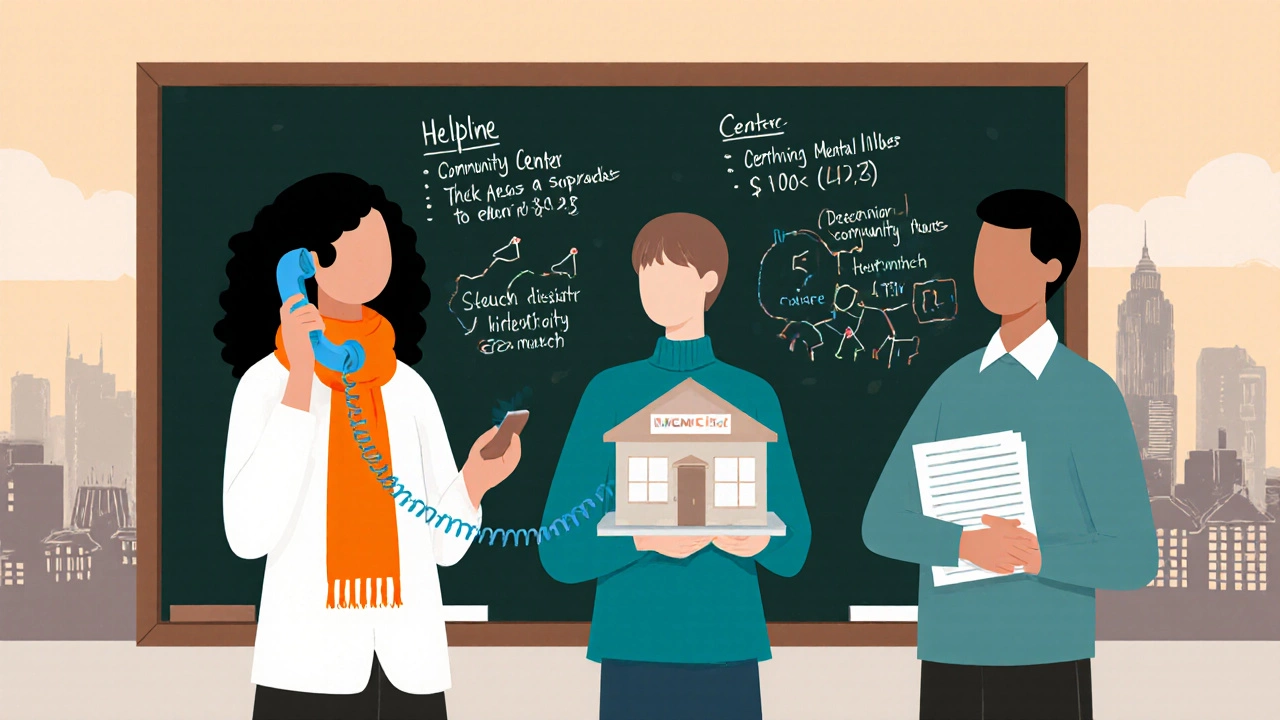Explore whether Mind stands as the UK's top mental health charity, compare its impact with peers, and discover how to support mental health causes.

- Created by: Lydia Carmichael
- Completed on: 10 Oct 2025
- Categories: Charities
UK Mental Health Charity Leaderboard
Use this interactive tool to compare the top UK mental health charities based on key performance indicators. Select your priority areas to see which charity aligns best with your values.
| Charity | Annual Income (£m) | People Served Annually | Core Focus | Years Operating |
|---|---|---|---|---|
| Mind | 85 | 1.5m | Helpline, advocacy, information | 36 |
| Rethink Mental Illness | 55 | 250k | Community support, self-help groups | 43 |
| Mental Health Foundation | 23 | 100k | Research, public education | 47 |
Mind
Leaders in income and direct-service reach
- Income: £85m
- Reach: 1.5m people
- Focus: Helpline, advocacy
Rethink Mental Illness
Specializes in community-based programs
- Income: £55m
- Reach: 250k people
- Focus: Community support
Mental Health Foundation
Dominates research and policy influence
- Income: £23m
- Reach: 100k people
- Focus: Research, education
When you hear the name Mind charity, you probably think of a nationwide helpline, bright orange branding, and a steady stream of media campaigns. But does that reputation translate into being the top mental health charity in the UK? Below we break down the data, compare Mind with its peers, and give you a clear picture of who really leads the field.
Quick Takeaways
- Mind raises the most public donations among UK mental‑health charities, with £85million in annual income (2023).
- Its helpline handles over 1million contacts a year, making it the most widely used direct‑support service.
- Rethink Mental Illness and the Mental Health Foundation outperform Mind in research funding and community‑based projects respectively.
- Criteria for “leading” include revenue, reach, measurable outcomes, and policy influence.
- Choosing a charity depends on whether you value direct services, research, or advocacy the most.
Understanding what “leading” really means requires a look at the numbers, the programs, and the broader ecosystem that includes the NHS, the UK Government, and the regulator Charity Commission. Let’s unpack each piece.
What Makes a Mental Health Charity “Leading”?
A charity can claim leadership in several ways. First, financial scale matters - larger budgets usually mean more staff, broader reach, and stronger advocacy power. Second, service reach counts: how many people does the organization actually help each year? Third, measurable outcomes - reductions in crisis calls, improved treatment uptake, or policy changes - provide evidence of impact. Finally, influence on public policy and research can cement a charity’s status as a thought leader.
In the UK, the Charities Commission is the regulator that publishes annual reports on income, beneficiaries, and governance. Those reports give us a reliable baseline for comparing organisations.
Mind: Size, Reach, and Impact
Mind is a mental‑health charity founded in 1989 that provides information, advocacy, and a 24/7 helpline for anyone in England and Wales. According to its 2023 annual report, Mind reported a total income of £85million, of which £45million came from public donations and £20million from contracts with the NHS. It employs roughly 1200 staff members and works with over 2000 volunteers across 150 local branches.
Mind’s helpline logged 1.1million contacts in 2023, a 12% increase from the previous year. Its online resources attract 4million unique visitors each month, and its policy team influences more than 30 pieces of legislation annually, ranging from the Mental Health Act amendments to funding allocations for community services.
Outcome data shows that callers who receive a Mind helpline intervention report a 30% improvement in crisis management scores after three months, according to an internal evaluation commissioned by the Department of Health and Social Care. Those figures place Mind at the top of the UK for direct‑contact services.

How Mind Stacks Up Against Other UK Charities
To gauge leadership, we need side‑by‑side data. Below is a comparison of Mind with two other major players: Rethink Mental Illness and the Mental Health Foundation. All figures are pulled from the latest Charities Commission filings (FY2023‑24).
| Charity | Annual Income (£m) | People Served Annually | Core Focus | Years Operating |
|---|---|---|---|---|
| Mind | 85 | 1.5m (direct contacts) | Helpline, advocacy, information | 36 |
| Rethink Mental Illness | 55 | 250k (community projects) | Community support, self‑help groups | 43 |
| Mental Health Foundation | 23 | 100k (research participants) | Research, public education | 47 |
The table shows that Mind leads in income and direct‑service reach, while Rethink excels in community‑based programs and the Foundation dominates research funding.
Why Many People Consider Mind the Top Choice
Brand visibility plays a huge role. Mind’s orange logo appears on public transport, TV ads, and social media campaigns that reach millions. That exposure drives donor confidence - 62% of people who donate to mental‑health causes cite “recognition” as a deciding factor.
Beyond marketing, Mind’s service model is uniquely comprehensive. The helpline (run by trained counsellors) is complemented by face‑to‑face support groups, digital tools, and a legal rights service. The charity also runs annual policy summits that bring together NHS executives, MPs, and service users, cementing its role as a bridge between grassroots experiences and national decision‑making.
Finally, Mind’s financial transparency scores high on the Charity Commission’s “Good Governance” index, earning a 4‑star rating for three consecutive years. That metric reassures donors that their money translates into measurable outcomes.
Potential Blind Spots - Where Other Charities Excel
Rethink Mental Illness focuses heavily on local community hubs. Its “Living Well” programmes deliver peer‑led workshops in over 200 venues, reaching groups that may never call a helpline. Evaluation reports show a 45% improvement in participants’ self‑reported confidence after six weeks, a figure Mind’s short‑term crisis support cannot directly match.
The Mental Health Foundation, on the other hand, invests roughly £8million annually in research projects that shape national guidelines. Its evidence‑based campaigns on suicide prevention have been adopted by the UK Government as part of the 2024 Mental Health Strategy.
These strengths suggest that “leading” depends on the metric you value: direct help (Mind), community empowerment (Rethink), or scientific evidence (Foundation).

How to Decide Which Charity Aligns With Your Values
If you’re a donor or volunteer, ask yourself three quick questions:
- Do I want my money to fund immediate crisis support or long‑term research?
- Am I looking for national reach or local community impact?
- How important is transparency and governance to me?
Score each charity on a 1‑5 scale for the above criteria, total the points, and you’ll see which organization matches your personal priorities.
Getting Involved - Volunteering and Donating
All three charities rely on volunteers for front‑line support, fundraising events, and research assistance. Mind offers a “Phone Support Volunteer” role that requires a 20‑hour training module and a commitment of at least six months. Rethink’s “Community Champion” positions involve organizing local meet‑ups and can be as flexible as one afternoon a week. The Foundation seeks “Research Assistants” - often university students - to help with data collection.
Donations can be one‑off or recurring. Mind’s online platform makes it easy to set up a monthly gift, and the charity issues a tax‑benefit receipt that meets HMRC requirements. If you prefer a “impact‑linked” giving model, the Mental Health Foundation allows donors to fund specific research projects and receive annual outcome reports.
Regardless of the route you choose, the key is to align your contribution with the type of impact you want to see.
Frequently Asked Questions
Is Mind the biggest mental health charity in the UK?
In terms of annual income and direct‑service contacts, yes. Mind reported £85million in revenue and over one million helpline interactions in 2023, outpacing other major charities.
How does Mind’s impact compare to Rethink Mental Illness?
Mind excels in nationwide crisis support, whereas Rethink specializes in community‑based peer groups. Rethink’s local programmes often achieve higher improvements in participant confidence, but serve fewer people overall.
Can I donate to a specific Mind programme?
Yes. Mind’s website lets donors earmark funds for the helpline, legal rights service, or youth outreach. Each earmarked gift comes with an impact update.
Do mental health charities work with the NHS?
All three charities collaborate closely with the NHS. Mind has contracts to provide triage services, Rethink runs integrated community clinics, and the Mental Health Foundation supplies research that informs NHS treatment guidelines.
What are the biggest challenges facing UK mental health charities?
Funding volatility, increasing demand for services, and the need to show measurable outcomes are top challenges. Additionally, charities must navigate policy changes from the Department of Health and Social Care while maintaining public trust.